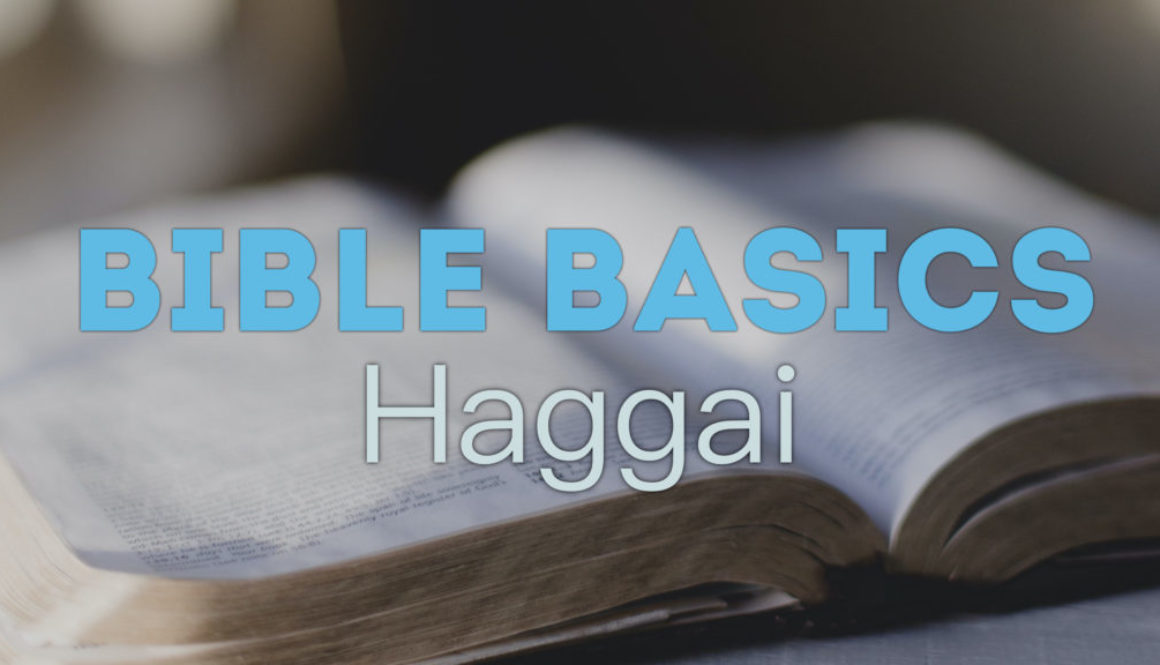Haggai
Author
The book is written by “Haggai the prophet” (1:1). Beyond this simple introduction, not much is know about the man. There is no description of Haggai’s family line, geographic association, or other information about him personally.
His name means “festal.”
According to Jewish tradition, Haggai is listed amongst the last of God’s prophetic witnesses (1 Maccabees 9:27). According to some early Christian writers, Haggai came from a priestly bloodline, although there is no evidence for this claim.
Some textual traditions have also linked Haggai as either the author or co-author of Psalms 111, 125-16, and 145-148, though not all of these traditions agree to which ones Haggai may have been part of writing. All the evidence linking him to the Psalms is questionable. The link was likely made at a later date based on popular traditions at the time.
Date
Haggai was a post-exile prophet, preaching about God’s restored glory to Israel after the release of captivity, after Babylon had fallen to the Persians in 539B.C. The first Jews returned to their homeland under the edict given by King Cyrus (see Isaiah 45). Those early returnees began the reconstruction of God’s temple under the leadership of Ezra (Ezra 6:3-5), however the work was no complete. The work is halted when Darius the Great takes the throne.
It is at this time that Haggai comes on to the scene. He specifically begins his prophesy in August of 520B.C. (specific date given in Haggai 1:1). His book is completed by December of the same year (see 2:10 and 2:20).
Audience and Purpose
Haggai was writing to the retuned Jews living in Jerusalem who, though they were rebuilding their own homes and restoring life in the land, they were ignoring God’s temple, and by implication, the full return to faith and worship (1:2-11).
Contrary to the way God’s people usually responded to Old Testament prophets, the people do obey Haggai, and rebuilt the temple (1:12-15). Haggai goes on to prophesy the return of God’s glory to the temple, greater than before (2:9), a renewed peace in the land, and God’s blessing on the people.
This rebuilt temple would be dedicated in 516B.C; exactly 70 years after Solomon’s temple was destroyed (see Ezra 6:15 and 2 Chronicles 36:21).
Major Themes
- God’s Promise of Restoration.
- God’s Faithfulness.
- Fulfilled Prophecy. Seventy years for the land to rest was prophesied by Jeremiah (2 Chronicles 26:21). The rebuilt temple marks the completion of this period, from the destruction of Solomon’s temple, to the dedication of the new temple.
- God’s Glory and the Nations. Haggai does not end his book by simply prophesying God’s glory to Israel, but that all the nations would share in in (2:7).
Key Scriptures
- Haggai 2:6-7 — “For thus says the LORD of hosts: Yet once more, in a little while, I will shake the heavens and the earth and the sea and the dry land. And I will shake all nations, so that the treasures of all nations shall come in, and I will fill this house with glory, says the LORD of hosts.”
Outline
- Haggai 1:1-11 — Prophecy Concerning the Rebuilding of God’s Temple
- Haggai 1:12-15 — People’s Response to the Prophecy
- Haggai 2:1-9 — Prophecy Concerning the Latter Glory of the Temple
- Haggai 2:10-19 — Prophecy Concerning Holiness, Repentance, and Blessing
- Haggai 2:20-23 — Prophecy Concerning Zerubbabel
Gospel Summary
The destruction of the temple in Jerusalem was the lowest point in Israel’s history, as all of life centered on temple worship. However, with the reconstruction of a new temple, and a promise of God’s glory, greater than before, there is hope. People are pulled out of passivity and restored to a passion for worship and faith.
Jesus would stir pall the emotions Israel felt in the destruction and rebuilding of this temple when He would speak of Himself in hidden language: “Jesus answered them, ‘Destroy this temple, and in three days I will raise it up.’ The Jews then said, ‘It has taken forty-six years to build this temple, and will you raise it up in three days?’ But he was speaking about the temple of his body. When therefore he was raised from the dead, his disciples remembered that he had said this, and they believed the Scripture and the word that Jesus had spoken” (John 2:19-22).
Haggai’s promise that the latter glory would be greater than the former (2:9) finds its fulfillment in Christ and His people, who are the true temple of the Holy Spirit, where the glory of God dwells on earth.
Haggai prophesied that God would restore Israel’s glory, shaking the nations and that all people would worship in the restored temple. We see the true fulfillment of this promise when Simeon holds the baby Jesus in Luke 2:32, and sees in him “a light for revelation to the Gentiles, and for glory to your people Israel.”
If you’re enjoying the content I produce, a little caffeine to keep me going would be appreciated!
© Anthony Scott Ingram 2021. All Rights Reserved.
Photo by Carolyn V on Unsplash
Unless otherwise indicated, all Scripture quotations are from The Holy Bible, English Standard Version®, copyright © 2001 by Crossway Bibles, a publishing ministry of Good News Publishers. Used by permission. All rights reserved.”
Please note that I do get a small kickback from Amazon for any purchases made using the links on this post. Should you choose to purchase from them, I just want to say thank you for further supporting my work in ministry!
